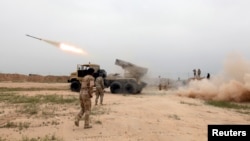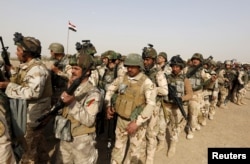Iraq's security forces launched an operation to retake control of Ar-Rutbah, a town in western Anbar province that links Islamic State-controlled areas there with the Jordanian and Syrian borders.
"You can look on a map and see the significance of that part of Anbar province," U.S. Defense Department spokesman Peter Cook told reporters Monday. "If the Iraqi security forces were able to secure Rutbah, it would be a significant step forward in the fight against ISIL and a significant step in terms of being able to cut off that flow from the Jordanian border from west to east towards Baghdad."
Earlier this year, Islamic State lost control of a stretch of territory in eastern Syria and across the border near Sinjar, Iraq, interrupting what had been a line of control extending from Syria's Deir Ezzor province to Mosul and areas farther south in Iraq.
Losing the far western link around Rutbah would leave only the Qaim area, also in Anbar province, as a solid line of Islamic State control between Syria and Iraq. That stretch is vastly important for the militant group because it runs through its de facto capital in Raqqa, Syria, and connects to a border crossing with Turkey that can be used to bring in supplies and fighters.
Cook gave his latest assessment of the overall fight against the militant group Monday, saying it now has lost 45 percent of the territory it once controlled in Iraq and between 16 and 20 percent in Syria.
Islamic State swept through large areas of northern and western Iraq and eastern Syria in the middle of 2014, overwhelming Iraqi forces and taking advantage of the chaotic civil war in Syria to establish its self-declared Islamic caliphate. The severity of the offensive is clear from casualties suffered by Iraqi troops. In June 2014, 886 members of the Iraqi security forces were killed, compared to 196 the month before, according to U.N. data. More than 5,200 were killed last year and more than 1,500 have been killed so far in 2016.
Militia fighters and a U.S.-led coalition conducting airstrikes against the militants have been key in supporting Iraqi forces in operations to recapture areas such as Ramadi and Tikrit during the past year. In Syria, efforts have been concentrated along the country's northern border with Turkey, where Islamic State once controlled several hundred kilometers and multiple key crossings. Today, according to the Institute for the Study of War, Islamic State controls less than 100 kilometers along the border north of Aleppo.
In both Iraq and Syria, violence linked to the Islamic State group has killed thousands of people and created humanitarian emergencies, with people struggling to get access to food and healthcare. Many have fled their homes, either to other areas within the two countries or to Turkey, Jordan, Egypt and Europe. Those migrations have come with their own set of problems, with sometimes negative receptions from communities and governments struggling to provide basic services for increased populations.






